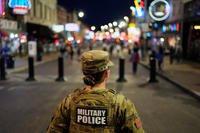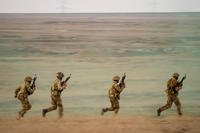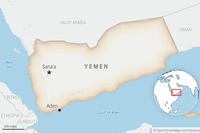U.S. forces have launched strikes on five Iranian-backed militia positions in Iraq and Syria Sunday following a series of rocket attacks on U.S. bases in Iraq, including one that killed an American contractor and wounded four U.S. troops.
The "defensive strikes" on facilities of the Kata'ib Hezbollah (KH) facilities were intended to "degrade KH's ability to conduct future attacks against" the U.S. and coalition forces, Jonathan Hoffman, the Pentagon's chief spokesman, said in a statement.
He said the three KH locations in Iraq and two in Syria that were hit included weapons depots and command and control positions that the militia group had used to plan and execute a series of recent attacks on friendly bases in Iraq.
Hoffman did not describe how the attacks were conducted or what munitions were used, but the U.S. maintains a full array of fixed-wing and rotary attack aircraft in the region, as well as precision missile systems. Citing U.S. officials, CNN reported that F-15 Strike Eagle fighters conducted the strikes.
In the most recent attack on U.S. positions, KH paramilitaries fired more than 30 rockets Friday at a U.S. base near Kirkuk in north-central Iraq, resulting in the death of an American contractor and injuries to four U.S. military personnel and two members of the Iraqi Security Forces, Hoffman said.
Related: US Contractor Killed in Iraq Rocket Attack
Similar attacks led the U.S. to evacuate nonessential personnel from the U.S. Embassy in Baghdad earlier this year and close the U.S. consulate in Basra.
In his statement, Hoffman noted that the U.S. respects Iraqi sovereignty and the independence of the Baghdad government in exercising control of operations within its territory, but added that the U.S. "will not be deterred from exercising its right of self-defense."
Hoffman charged that "KH has a strong linkage with Iran's Quds Force," a unit of Iran's Islamic Revolutionary Guard Corps formed to carry out unconventional warfare, and "has repeatedly received lethal aid and other support from Iran that it has used to attack OIR coalition forces."
In April, the U.S. designated the IRGC as a foreign terrorist organization, or FTO. In a statement, President Donald Trump said that "This designation will be the first time that the United States has ever named a part of another government as an FTO."
The U.S. has also closely tracked the activities of the Quds force within the IRGC. In 2007, the U.S. Treasury Department cited the Quds Force, led by Maj. Gen. Qasem Soleimani, "for its support of terrorism," and described it as Iran's "primary arm for executing its policy of supporting terrorist and insurgent groups."
The KH militias are part of a number of Shia groups in Iraq's Popular Mobilization Forces, which were formed in 2014 to fight the Islamic State alongside the Iraqi Security Forces.
KH militia members fought against the 2003 U.S. invasion of Iraq. The militia's leader, Abu Mahdi al-Muhandis, who has dual Iranian and Iraqi citizenship, has frequently met with Soleimani, according to the State Department.
In July testimony to the Senate Foreign Relations Committee, Michael Mulroy, then deputy assistant defense secretary for the Mideast, said that Iran's continuing "cynical interference" in Iraq was undermining stability.
"Our primary concern is the extent to which non-compliant militias, more loyal to Tehran than Baghdad, undermine the Iraqi prime minister's legitimate authority, prey on ordinary Iraqis and destabilize the fragile communities recently liberated from ISIS control," Mulroy said.
-- Richard Sisk can be reached at Richard.Sisk@Military.com.
Read More: The Air Force's Lifesaving U-2 Space Suit Is Evolving














